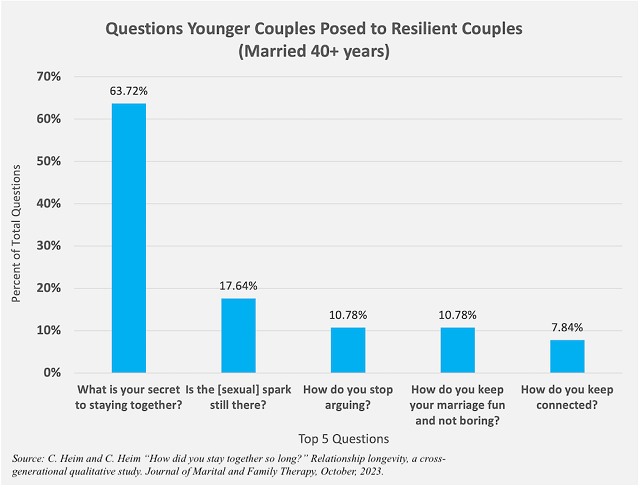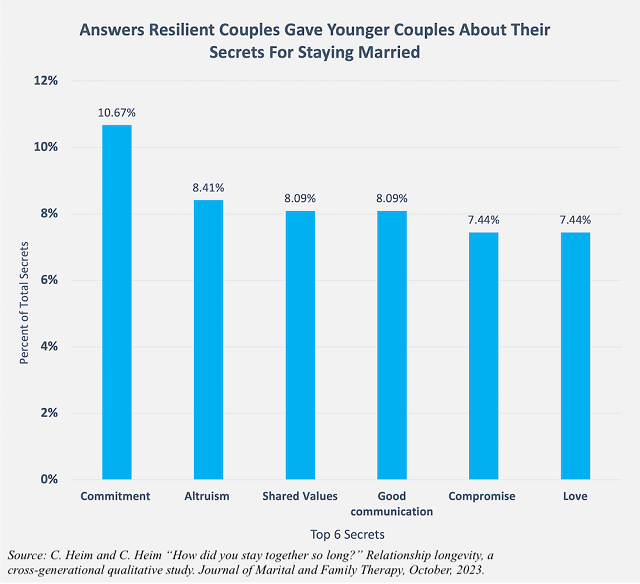Highlights
- “The most selfish thing two people can do for their long-term selves is to nurture their long-term relationship.” Post This
- The “secret to staying together” was the most popular question asked of resilient married couples, especially by couples married 6 to 10 years. Post This
- Commitment was the number one glue-secret for resilient married couples, who used the word, on average, more than 4 times per interview. Post This
In the largest cross-sectional, global study of long-term relationships to date, we asked younger couples from 14 different countries who had been together 3 to 15 years, “If you could pose a question to couples married over 40 years, what would it be?” The questions they posed should be a sharp wake-up call to us all. Even in our current hyper-individual Zeitgeist, these younger people want their relationships to stay together. We also asked the resilient couples a similar question on what advice they would offer, and the answers they gave are an even greater wake up call.
There is now something of a resurgence of academic interest in marriage and long-term relationships. Recent books, well-grounded in evidence, for example, are urging us to Get Married in All or Nothing Marriages to make The Case Against the Sexual Revolution by focusing on Us: Beyond You and Me. Recent studies show that married people report higher levels of well-being, and are happier even after controlling for the risk of divorce. This is on the back of decades of evidence showing the physical health, mental health, and happiness and emotional-well-being benefits of marriage and long-term relationships. This, in turn, confirms the human wisdom of millennia: that long-term coupling helps us survive, thrive, and makes for safer and more stable societies.
With such a strong evidence base, it is a wonder that marriage or long-term coupling would ever be in decline. Yet, over the past five decades, we have seen unprecedented rates of marriage decrease and divorce increase. In this context, young peoples’ attitudes towards marriage grow negative or indifferent to compound the problem.
In spite of this, many young couples do commit to each other, and they want their relationships to last. If it takes a village to raise a child, it may well take a village to help sustain committed relationships once they start. As our Resilient Relationship study shows, a long-term relationship is “d*** hard work” (Carol and Steven, married 40 years). What happens, then, when you are surrounded by hyper-individual ideals urging you to take care of yourself first, engage in instant self-pleasures, pursue career and kudos before relational safety, and be ‘me’ rather than ‘we’ focused? It is no wonder that many young people look up in awe at their grandparents to metaphorically ask, “how did you stay together for 50 years when we’re struggling after 50 days?”
As researchers, we wondered if, to help nurture relationship resilience, younger couples felt they could benefit from the experience of older couples with proven resilience.1 The figure below highlights the questions younger couples in our study wanted to pose to resilient couples (married 40+ years).

As the figure illustrates, the “secret to staying together” was the most popular question asked, especially by couples married 6 to 10 years. This revealed that young people want relationship longevity but perhaps believe that there is a key ingredient, some secret glue—or at least some piece of hidden information they are missing.
The second arm of the study was 90 in-depth interviews with 180 coupled individuals married 40+ years, who were given the opportunity to answer the questions posed by younger couples.2 The figure below shows the answers the older couples gave about the “secret” of their longevity.

Commitment. Consistent with studies dating back some 30 years, commitment was the number one glue-secret. Couples told us that commitment was “essential,” “the glue,” “vital,” and “the ultimate important thing.” We were told that commitment encompassed marriage vows, “sticking together” in times of hardship, and actively showing commitment to the relationship “on a daily basis.” For many couples, commitment and the meaning of commitment evolved over their decades. For others “commitment is from the get go, from the very start … we’re in it for the long haul, it’s a marathon, we expect bumps. Divorce isn’t sort of anything that we’re going to accept” (husband, married 54 years). Through interview transcripts, we discerned that couples used the word commitment, on average, more than four times per interview.
Altruism. The number two glue-secret was altruism, or being giving, unselfish, even sacrificial (a word with perhaps little currency today). This novel finding may be a reflection of what older couples feel is needed in the face of hyper-individual pressures, like the relentless pursuit of self-expression, solipsism, and hedonist pleasures: “Be unselfish, think of that other person’s needs more than your needs. It’s hard … give to the other person more than yourself” (husband, married 49 years).
Shared values. The third glue-secret was shared values. Two people naturally bring their own individual values into a relationship and learn to negotiate shared values from there. Some couples, however, talked about how they forged their values together from early on: “When we met, I was 17, he was 20. Our value system hadn’t really developed. Through living together and talking together, we basically developed the same values” (wife, married 60 years).
Good communication, give and take, and love made up the next three glue-secrets. Others included teamwork, respect, a family focus, forgiveness and friendship. Not that they aren’t important, but having great sex, fun, a career focus, or a search for celebrity did not make the list; perhaps they are the icing to some of the core glue-secrets. They may or may not have been captured under the rubrics of common interests and shared values.
Evidence about how much marriage and long-term relationships contribute to health, happiness, and well-being for individuals and society needs to be known, accepted, disseminated, and applied. It will also take knowing, accepting, disseminating, and applying the evidence of what it takes to nurture resilience in relationships, including the need for commitment, altruism, and shared values. Both sets of evidence would ideally need to be valued and supported by individuals and also in greater society.
These are not secrets, yet they are not widely accepted, and their value is questioned. If they were known, accepted, and valued, more young couples would be equipped with tools to live out some of their hyper-individual ideals and their resilient relationship ideals concurrently. Having interviewed or surveyed over 1200 people married 40+ years, our study, now published as a book, concludes that: “The most selfish thing two people can do for their long-term selves is to nurture their long-term relationship.”
With effort from two people, a couple can actually have it all. Perhaps that’s the secret. As Susan and Bruce (married 49 years) remarked, “We think of ourselves as a jigsaw puzzle. If one of us is not there, the puzzle is not complete.” With the help of insights like this, perhaps the puzzle of reconciling hyper-individualism and relationship resilience can be solved.
Christian Heim is a clinical psychiatrist and senior lecturer at The University of Queensland and Caroline Heim is an Associate Professor at Queensland University of Technology in Australia.
1. We surveyed younger coupled individuals (n=137) and asked “If you could pose a question to a couple married over 40 years, what would it be?” This became one arm of our (n=1402) Resilient Relationships Study (RRS), the largest qualitative study on long-term relationships to date. Results have been published in a book and a journal article. The study used mixed methodology, privileged the couples’ voice, and was corroborated with clinical experience. The aim was to be salutogenic: to articulate what goes right in resilient relationships rather than being pathogenic and articulate what goes wrong in distressed relationships. Relationship resilience was defined as two people married for over 40 years. Satisfaction was not a focus of the RRS which was solely centred on longevity.
2. Interviews lasted 45 to 120 minutes. Interviewed couples were married between 40 and 73 years and, in the course of the interviews. The third arm of the RRS was a survey of individuals in relationship over 40 years (n=985) to help validate, through mixed methodology, information gathered from the in-depth interviews.










